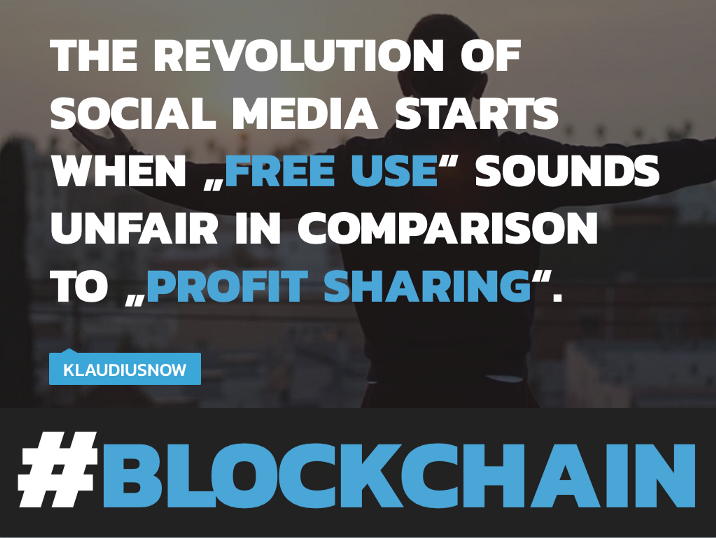If, in the course of digitisation, the future of human work can only be value-adding through empathy, social interaction and creativity, because everything else is mechanical and automated, the digital platforms in which this value creation happens should be profitable for all users.

The digitisation of our world is progressing steadily and the voices prophesying the danger of a future with fewer jobs for the majority of the population are getting louder. Entrepreneurs like Jeff Bezos (Amazon) or Facebook boss — Mark Zuckerberg, who are among the biggest drivers of digital change and have already implemented a high degree of automation in their companies, publicly declare that solutions for financial security for the majority of the population, such as the unconditional basic income, are indispensable.
While studies measure the vulnerability of up to 90 per cent of all jobs, the exact percentage is, in my view, not so crucial, because we know that digitization is unstoppable and will progress in the course of globalisation, not only because of the price competition. How many jobs are affected is therefore not a question of industry and degree of danger but a question of time horizon.
In addition to the question of the financial dependence between work and income, there is also the much more crucial social question. How do people who have learned over generations that working is an integral part of self-identification develop emotionally? How is our society developing, which not only ensures its own livelihood with its work but is convinced that it also makes a valuable contribution to our coexistence?

It is probably unbelievably far-reaching to think that our online activity solves all upcoming problems, but is it not well imaginable today that creating a status update, posting, commenting, recommending, writing, evaluating and investing daily time in our “personal small online brand” and our digital circle of friends, even reading and consuming digital content, can be one of the components that “finance” our lives and make a social contribution in a modern world.
It is up to us to create value for us as human beings from digitalization, which perhaps will contribute to making work look different — easier — more natural — more social.
The Industrial Revolution 4.x, or whatever fictitious versioning is behind it, gives with the decentralization by the Blockchain technology for the first time **the chance to avoid monopolistic profiteers of innovations ** and to distribute income, knowledge and power in such a way that the result pays for our actual quality of life.
Okay — let’s get to the point that really matters in this context: if the editors of the studies are right, and my understanding of technology does not contradict this, **it will be activities that have a high proportion of empathy, creativity and social interaction that become the most important part of all value-adding activities carried out by people **. Activities that are difficult to imitate through artificial intelligence and a virtual world. And “damn straight!” That’s a good thing! And “damn straight again!” the digital and social platforms: Facebook, YouTube, Instagram, Snapchat are the places where these activities (at least online) find a home in our ever more intensive online life. The amount of time spent online increases annually and the growing generation perceives online interaction as a natural, authentic component of daily life.

So why is it important to change these networks or at least to get them to change?
If you consider the current reporting of accusations against social networks such as censorship, fake news and in particular the misuse of data, you will find list-wise approaches that justify a decentralized rethinking in terms of social media.
Everything Important, Everything Right!
But when it comes to the future, when creativity in the form of creating all kinds of content or the emphatic, social interaction becomes the most valuable activity a person can perform, isn’t it even more important that this activity or the online platforms that give many people the tools to be creative , reward this activity accordingly?
What our parents regard as a gimmick or a waste of time may become an important social task.
Our digital activities, which are seen by our parents as gimmicks or a waste of time, lead to data and databases that are monetized into advertising revenues in double-digit billions (Google 95.4 billion USD, Facebook 39.94 billion USD (source statista.com)). These billion-dollar sales and the resulting profits currently belong to the operators of this platform.
It’s not that I think the operators have any bad intentions. On the contrary, in my humble opinion, these platforms are fantastic, innovative and bring real added value. It is just that it can’t be safe and right that they bundle most of the profit with it and have an unimaginable power through their monopoly position. It seems to me as if it is a natural process that a new technology compensates this imbalance.
There are already some companies that tackle this, such as Appics. Let’s hope that these platforms have the right ideas to create the vital network effect that helps us and our friends to connect to a new platform.
But since the only thing nicer than a “free service” is a service where you get paid to use it, I see great chances that a new platform can actually establish itself next to the big players.
The decentralization of social media plattforms not only solves the problems for which they are currently under criticism, but advertising revenues can also be distributed fairly between producers, consumers and all other shareholders, and with much luck, a completely different, new digital work environment can be re-diversified here. A future job market based on the fair distribution of marketing budgets. What a chance!
Thank you for your attention — in my world you should be rewarded for that! :)
Inspiriert von:
The fourth industrial revolution | Klaus Schwab
The Four | Scott Galloway
Dr. David Richard Precht
✅ @klaudius, I gave you an upvote on your first post! Please give me a follow and I will give you a follow in return!
Please also take a moment to read this post regarding bad behavior on Steemit.
Cool, thanks for sharing.